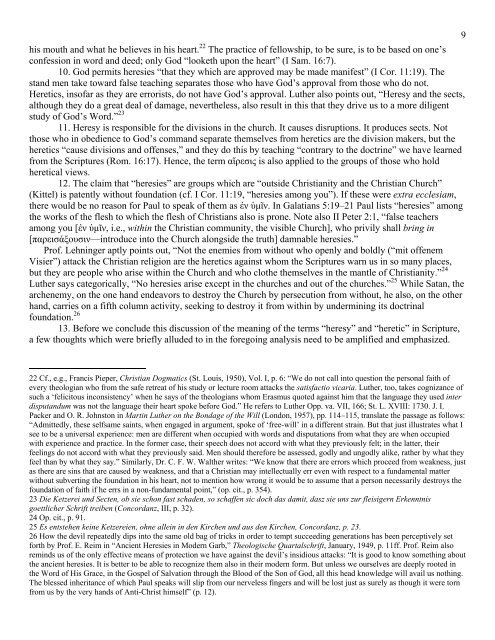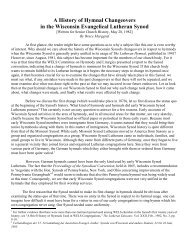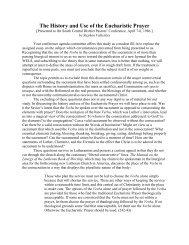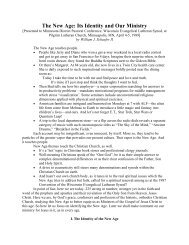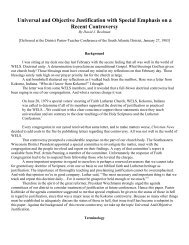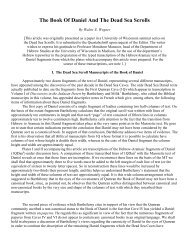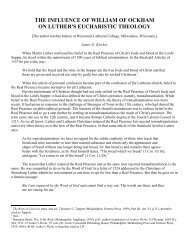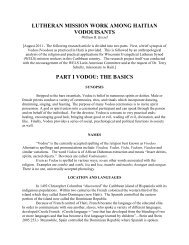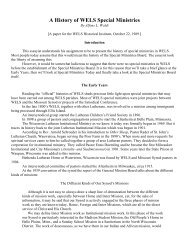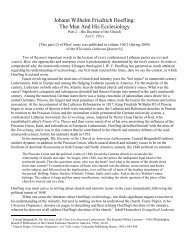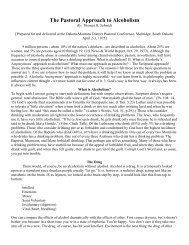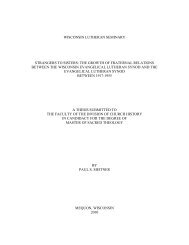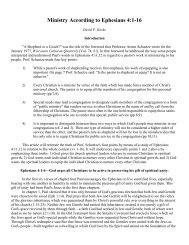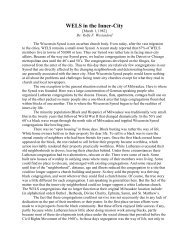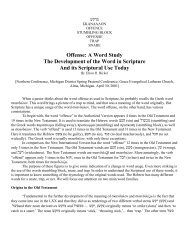What Is Heresy? - Wisconsin Lutheran Seminary Library: Essays
What Is Heresy? - Wisconsin Lutheran Seminary Library: Essays
What Is Heresy? - Wisconsin Lutheran Seminary Library: Essays
You also want an ePaper? Increase the reach of your titles
YUMPU automatically turns print PDFs into web optimized ePapers that Google loves.
9<br />
his mouth and what he believes in his heart. 22 The practice of fellowship, to be sure, is to be based on one’s<br />
confession in word and deed; only God “looketh upon the heart” (I Sam. 16:7).<br />
10. God permits heresies “that they which are approved may be made manifest” (I Cor. 11:19). The<br />
stand men take toward false teaching separates those who have God’s approval from those who do not.<br />
Heretics, insofar as they are errorists, do not have God’s approval. Luther also points out, “<strong>Heresy</strong> and the sects,<br />
although they do a great deal of damage, nevertheless, also result in this that they drive us to a more diligent<br />
study of God’s Word.” 23<br />
11. <strong>Heresy</strong> is responsible for the divisions in the church. It causes disruptions. It produces sects. Not<br />
those who in obedience to God’s command separate themselves from heretics are the division makers, but the<br />
heretics “cause divisions and offenses,” and they do this by teaching “contrary to the doctrine” we have learned<br />
from the Scriptures (Rom. 16:17). Hence, the term αἵρεσις is also applied to the groups of those who hold<br />
heretical views.<br />
12. The claim that “heresies” are groups which are “outside Christianity and the Christian Church”<br />
(Kittel) is patently without foundation (cf. I Cor. 11:19, “heresies among you”). If these were extra ecclesiam,<br />
there would be no reason for Paul to speak of them as ἐν ὑμῖν. In Galatians 5:19–21 Paul lists “heresies” among<br />
the works of the flesh to which the flesh of Christians also is prone. Note also II Peter 2:1, “false teachers<br />
among you [ἐν ὑμῖν, i.e., within the Christian community, the visible Church], who privily shall bring in<br />
[παρεισάξουσιν—introduce into the Church alongside the truth] damnable heresies.”<br />
Prof. Lehninger aptly points out, “Not the enemies from without who openly and boldly (“mit offenem<br />
Visier”) attack the Christian religion are the heretics against whom the Scriptures warn us in so many places,<br />
but they are people who arise within the Church and who clothe themselves in the mantle of Christianity.” 24<br />
Luther says categorically, “No heresies arise except in the churches and out of the churches.” 25 While Satan, the<br />
archenemy, on the one hand endeavors to destroy the Church by persecution from without, he also, on the other<br />
hand, carries on a fifth column activity, seeking to destroy it from within by undermining its doctrinal<br />
foundation. 26<br />
13. Before we conclude this discussion of the meaning of the terms “heresy” and “heretic” in Scripture,<br />
a few thoughts which were briefly alluded to in the foregoing analysis need to be amplified and emphasized.<br />
22 Cf., e.g., Francis Pieper, Christian Dogmatics (St. Louis, 1950), Vol. I, p. 6: “We do not call into question the personal faith of<br />
every theologian who from the safe retreat of his study or lecture room attacks the satisfactio vicaria. Luther, too, takes cognizance of<br />
such a ‘felicitous inconsistency’ when he says of the theologians whom Erasmus quoted against him that the language they used inter<br />
disputandum was not the language their heart spoke before God.” He refers to Luther Opp. va. VII, 166; St. L. XVIII: 1730. J. I.<br />
Packer and O. R. Johnston in Martin Luther on the Bondage of the Will (London, 1957), pp. 114–115, translate the passage as follows:<br />
“Admittedly, these selfsame saints, when engaged in argument, spoke of ‘free-will’ in a different strain. But that just illustrates what I<br />
see to be a universal experience: men are different when occupied with words and disputations from what they are when occupied<br />
with experience and practice. In the former case, their speech does not accord with what they previously felt; in the latter, their<br />
feelings do not accord with what they previously said. Men should therefore be assessed, godly and ungodly alike, rather by what they<br />
feel than by what they say.” Similarly, Dr. C. F. W. Walther writes: “We know that there are errors which proceed from weakness, just<br />
as there are sins that are caused by weakness, and that a Christian may intellectually err even with respect to a fundamental matter<br />
without subverting the foundation in his heart, not to mention how wrong it would be to assume that a person necessarily destroys the<br />
foundation of faith if he errs in a non-fundamental point,” (op. cit., p. 354).<br />
23 Die Ketzerei und Secten, ob sie schon fast schaden, so schaffen sic doch das damit, dasz sie uns zur fleisigern Erkenntnis<br />
goettlicher Schrift treiben (Concordanz, III, p. 32).<br />
24 Op. cit., p. 91.<br />
25 Es entstehen keine Ketzereien, ohne allein in den Kirchen und aus den Kirchen, Concordanz, p. 23.<br />
26 How the devil repeatedly dips into the same old bag of tricks in order to tempt succeeding generations has been perceptively set<br />
forth by Prof. E. Reim in “Ancient Heresies in Modern Garb,” Theologische Quartalschrift, January, 1949, p. 11ff. Prof. Reim also<br />
reminds us of the only effective means of protection we have against the devil’s insidious attacks: “It is good to know something about<br />
the ancient heresies. It is better to be able to recognize them also in their modern form. But unless we ourselves are deeply rooted in<br />
the Word of His Grace, in the Gospel of Salvation through the Blood of the Son of God, all this head knowledge will avail us nothing.<br />
The blessed inheritance of which Paul speaks will slip from our nerveless fingers and will be lost just as surely as though it were torn<br />
from us by the very hands of Anti-Christ himself” (p. 12).


